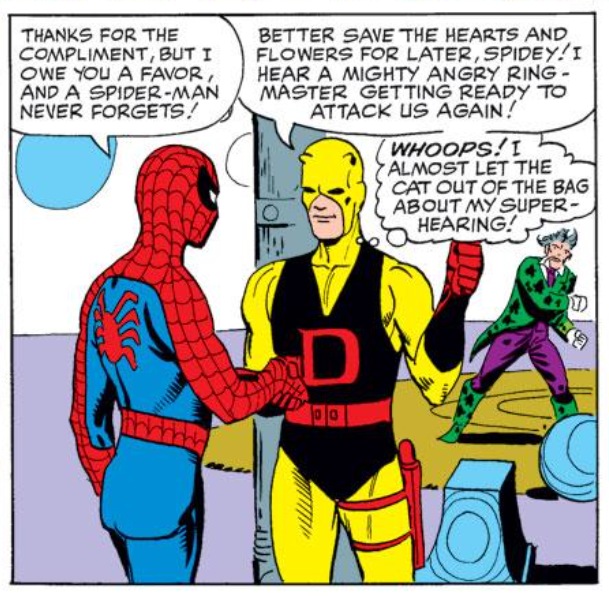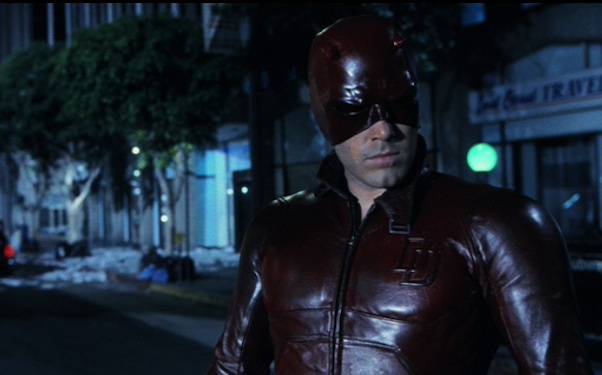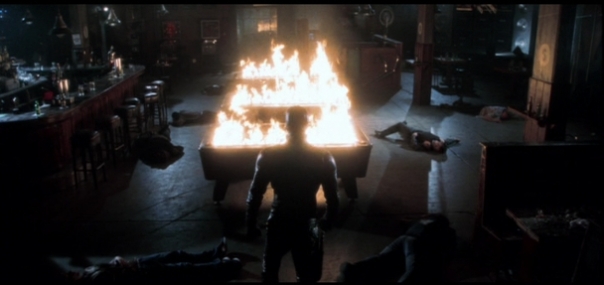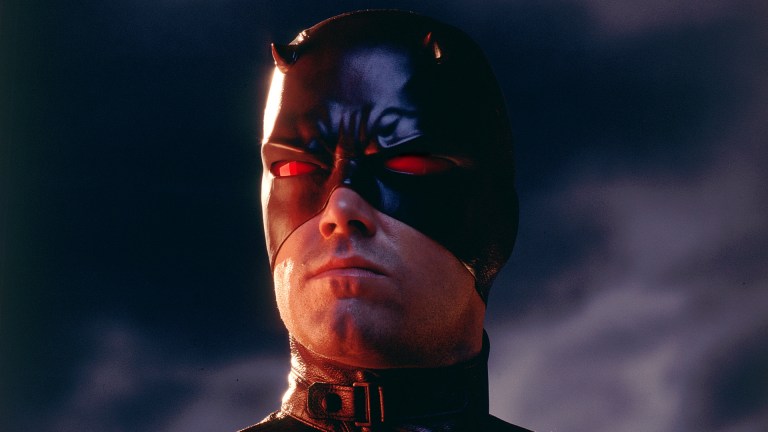Yes, I am seriously going to revisit the reviled 2003 film starring Ben Affleck as the titular blind superhero and Jennifer Garner supposedly as Elektra, who got her own turdtastic spin off movie but the less said about that the better.
 |
| 'Nuff said. No, literally. No more needs to be said. (In unrelated news, Days of Future Past was amazing, right? Sitting there with 92% and shit.) |
Just to clarify, I'm not actually reviewing the original theatrical release but the Extended Director's Cut for reasons that will be elaborated on below, most prominent being the fact that is the DVD I've got. Also, the Director's Cut is generally reckoned to be the superior film, again for reasons I'll elaborate on below (wow, I'm really setting up a lot of stuff to deliver on below, aren't I?).
Now, before we get into the nitty gritty of the Daredevil movie, and it is gritty, oh so very gritty, it might be a good idea to go into the comics since they're the source material and whatnot. Like all superheroes created in the 1960s, Daredevil's origin story revolves around radioactive material, because if there is one thing we all know, it is that radioactive exposure causes super powers always and cancer never.
While saving an old blind man's life (oh, the dramatic irony) from an oncoming truck, Matt Murdock has radioactive waste spilled in his eyes, which instead of killing him, renders him blind but heightens his other senses to superhuman abilities because radioactive. He can now 'see' by a sort of sonar due to his heighten hearing and has a superhuman sense of balance, because again, radioactive.
Daredevil actually started as a swashbuckling dashing superhero rather than the brooding anti-hero we know and love. Rather than being gritty realistic tales of urban life and criminal underworlds, the early Daredevil adventures were bright colourful affairs.
 |
| Colourful indeed. |
Before deciding that red is the new black, Daredevil sported a mostly yellow costume that loudly announced his presence to ever criminal in a three block radius, which made stake out missions a bit trickier than they needed to be.
And don't say try to give the man a pass by saying he's blind because, like everyone knows, Daredevil may be blind but luckily the radioactive waste that caused his blindness also heightened his other senses, including heightening his sense of touch so much that he can 'feel' colour.
Yes, one of Daredevil's powers is to feel colour. By which I mean he can tell just by touching something what colour it is by the heat that colors give off, since colours are well known for giving off heat. Though to be fair, a black shirt does retain heat more than a plain white T, so I guess there might be some scientific basis for this power. Possibly.
 |
| It doesn't quite explain his bitchin' master of disguise skills, though. |
The darker and more badass Daredevil we now recognise as the definite Daredevil was ushered into being by Frank "I'm the Goddamn Batman" Miller. I've already spoken about how Hollywood loves milking Miller's version of Batman for all he is worth (and he is worth all the money) but before he started grittying up the Dark Knight, making him realistic and stuff, Miller got his first big break grittying up the Man With No Fear, essentially writing crime stories with a superhero in them.
And that is where Daredevil excels. His power set isn't really impressive enough to face up against the uber powered big bads that the Avengers regularly go up against but is perfectly suited to smaller, more direct, but no less impactful, crime narratives featuring mob syndicates and kingpins. As a blind superhero, his world is all darkness and a cacophony of sound, which makes him uniquely suited for stories about the dark seedy underbelly of urban life.
 |
| As evidenced here. |
I don't want to dwell on Miller's run of the character since much has already been said about his run of the character elsewhere. However, I will mention how Brian Michael Bendis and Alex Maleev's partnership writing and drawing Daredevil, respectively, is one of the greatest partnerships on a superhero ever. Easy. Why that sounds like high praise, the fact is that they totally understand the character and what makes him unique among his super-powered peers.
Taking a natural, yet dark, noir tone, Bendis and Maleev craft a stunning narrative arc where Daredevil's secret identity is leaked to a newspaper and made public. However, the newspaper that ran the leak is a well-known tabloid with little credibility so initially the claims aren't entirely validated but they draw seriously unwanted media attention to Matt Murdoch.
And while all that is going on, the Kingpin is disposed from the head of the crime syndicate in Hell's Kitchen by a young upstart wiseguy and is presumed dead after he is stabbed about infinity times. And it was the young upstart wiseguy who spilt the beans on Daredevil's secret identity since he was a bit of a douche.
 |
| The newspapers scattered in the wind around Daredevil represent the scatter pieces of his life in the wake of the leak. That, or Hell's Kitchen has a serious litter problem. |
Basically, the comic is split between two fronts, the courts where Matt Murdoch is suing the newspapers for libel for saying that he is Daredevil, and in the streets due to the power vacuum with the Kingpin's absence. Needless to say, but it all leads up to a thrilling conclusion that I won't spoil here. Read it, it's good.
Daredevil was subsequently written by Ed Brubaker and then Mark Waid which are also amazing because holy hell, Brubaker followed by Waid! If you don't know who those people are but like comics, drop whatever you're holding, whether it is a book, cup of coffee, or a baby, and go read some of their stuff (I mean, that baby isn't even yours).
Now, this is all buildup for talking about the Director's Cut of Daredevil and why it is a superior movie than the original theatrical release. Firstly, it is important to note the both the director, Mark Steven Johnson, and Ben Affleck are huge Daredevil fans and wanted to do right by the character. Numerous shots in the movie are taken direct from panels in the comics and the movie is definitely made with respect for the source material. The problem with the film is that execution often doesn't match the intent.
 |
| "Do tell." |
For the Director's Cut is superior to the theatrical release in pretty much every way. There is a less focus on the romance between Matt Murdoch and Elektra, which felt rather forced in the theatric release. Daredevil doesn't actually get the girl, not even for the sex scene in the theatrical release, since to the director that underscores his unlucky in life/love character, where life never really goes his way but he perseveres regardless.
Matt Murdoch's relationship with his father is elaborated on and expanded so we can see the father-son bond that would shape his life as well as his conflict with his Catholic upbringing. On a similar note, Murdoch and Daredevil are giving equal time in the film, with a whole subplot featuring Coolio as a ganster Murdoch is defending in court is inserted into this version of the film. And this is great as it showcases his expert lawyer skills, which are a key component of who Matt Murdoch/Daredevil is. Thus, we see our hero straddle two very different views of justice, vigilantism and the legal judicial process, and this duality is at the core of the character.
The Director's Cut is rated R with harder violence and curse words, which fits the dark urban nature of Daredevil. Young Matt even says shit! That rapscallion. This is a vast improvement over the original version since there were a number of moments in that version where the tone of the movie and the way the scenes were shot suggested as though they were going to show the violence but then didn' due to the PG13 rating that kinda of neuters the original version. But the Director's Cut doesn't pull any punches and it shows.
 |
| With violence! And fire! Violent fire! Fiery violence! |
However, despite these improvements, the film still has its flaws. The music is too mired in nu metal/post grunge songs of the early 2000s which were already kinda dated when the movie came out, and that does make elements of the film's aesthetic seem inauthentic with forced angst, in a similar way to how the industrial techno music in Blade 2 dated that movie terribly.
Furthermore, while the film comes together a bit better than the theatrical release, the script is a little haphazard and doesn't have a real consistent narrative arc but rather is punctuated by notable scenes that don't often flow intuitively into each other.
And the way the film depicts Daredevil's radar sense is rather clever and looks real cool. Like bullet-time made out of sound. It actually makes sense in the way different sounds emit a different 'pulse' depending on how loud they are or what type of sound they are, and how they interact so Daredevil can see.
In other news, while Colin Farrell is delightfully over-the-top and absolutely hamming it up as the psychotic assassin Bullseye, his performance doesn't quite fit the at times overly serious and dramatic mood of the film.
On that note, while he occasionally verges on being over-the-top, Michael Duncan Clarke is near perfect as Kingpin. He genuinely comes across as imposing and a real threat. You can see him working his way up the ranks, doing what was necessary, and killing whomever was in the way, to get to where he is.
 |
| This is a man who will do whatever necessary to get what he wants. |
Now, I've already mentioned how I don't want to talk about Elekta, and Jennifer Garner isn't bad per se as Daredevil's sai wielding love interest but she isn't good either. In fact, there is one moment during their fight scene on the roof top where he is trying to explain that he didn't kill her father, and she says "Liar!" in the most ridiculous way. It's just a sharp reply but the inflection she puts on the word just makes me laugh everytime, which kinda kills the serious mood of the scene.
And now the Affleck. Contrary what some may believe, Affleck actually puts in a memorable performance as the Man With No Fear, presenting a believable depiction of a blind man, partly because the contacts he wore to give his eyes a milky hue actually blinded him a little.
Also, as Daredevil, he definitely has the chin acting chops for the scenes when he is in costume. No, really, have you seen that chin? It's a thing of beauty. No wonder he was cast as Batman. With a chin like that, criminals really would be a cowardly lot.
 |
| And all the geeks and fans will look up and shout "Aff-cleft!"... and I'll look down and whisper, "No". |
So, I guess I'm trying to say that if you dismissed Daredevil when you first saw it the cinemas or are thinking of rewatching it, make sure you watch the Director's Cut. It won't be perfect and part will still sit awkwardly, but it is a much better adaptation of one of Marvel's greatest characters.
References:
Daredevil (Marvel Comics character) Wikipedia page
Daredevil (film) Wikipedia page
Daredevil Comics2Film - Comic Book Resourses
Ben Affleck Daredevil Interview MTV
Ben Affleck "Dares to Dream Daredevil" MTV Interview
Daredevil (TV series) Wikipedia page
Frank Miller Wikipedia page
The 5 Dumbest Powers Ever Given To Famous Superheroes
Giving the Devil His Due: Why Daredevil is Marvel's Most Underrated Character
This comment has been removed by a blog administrator.
ReplyDelete